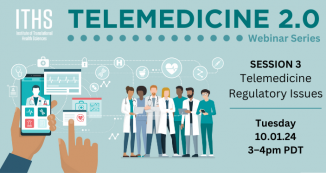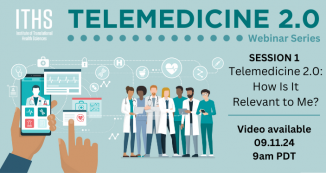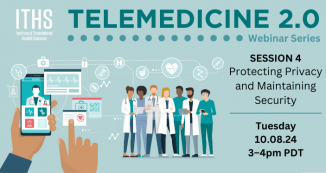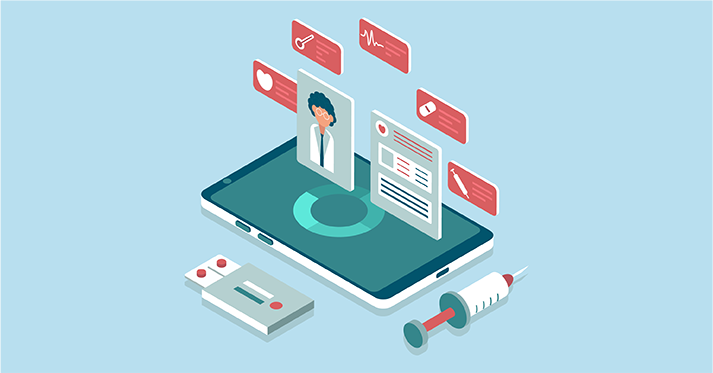
03 Aug Clinical, Regulatory, and Business Considerations in Telemedicine and Device-Related Digital Health: Session 1
Register below to receive Zoom link
Session #1: Introduction to/Overview of Telemedicine/Device-Related Digital Health
Event Video
Description
This three-part course will cover legal/regulatory and clinical issues regarding emerging care delivery technologies that have developed in the healthcare arena over approximately the past decade. Topics covered will focus on two primary aspects of this emerging technology: 1) telehealth/telemedicine, and 2) device-related digital health. The format will be live online (also recorded for later viewing) with a combination of slide presentations and discussion/Q&A, as well as 2 short segments involving panel participants from industry. The educational purpose is to provide healthcare providers, technology developers, and other supportive personnel involved in emerging care technology with critical time-efficient education that will help them keep pace with clinical and regulatory issues related to these rapidly changing advances in care delivery options.
Attendance will be taken at each session to track for the certificate units. Participation in all three sessions will equal six (6) total credits. People are encouraged to attend all three sessions, but can get credit (each session is two credits) for 1 or 2 sessions, if they don’t attend all three. They will only be eligible for credit for the sessions they attend. The University of Washington School of Medicine is accredited by the Accreditation Council for Continuing Medical Education to provide continuing medical education for physicians.
The University of Washington School of Medicine designates this course activity for a maximum of 6 AMA PRA Category 1 Credits™. Physicians should claim only the credit commensurate with the extent of their participation in the activity. (Each session is 2 credits.)
Session 1: Introduction to/overview of telemedicine/device-related digital health
Date: September 5th, 2023, 9–11am Pacific
Session 2: Planning/implementing new or additional telemedicine programs
Date: September 12th, 2023, 9–11am Pacific
Session 3: Planning/implementing new or additional device-related digital health projects/programs
Date: September 19th, 2023, 1–3pm Pacific
Event Materials
8 MBSLIDE PRESENTATION: Telemedicine and Device-Related Digital Health: Session 1Learning Objectives
By the end of this session, attendees will be able to:
- Identify and describe basic overall clinical, regulatory, and business concepts underlying telehealth/telemedicine and device-related digital health, including how the two areas are generally related to or different from each other.
- Identify and describe examples of key clinical, regulatory, and business considerations separately related to a) telehealth/telemedicine practice and b) development/use of device-related digital health.
- Identify and describe key clinical, regulatory, and business considerations specifically related to data privacy and security in both the telehealth/telemedicine and device-related digital health arenas.
Schedule of Activities
9:00-9:05am – Welcome, Overview, Introductions
9:05-10:55am – Presentation and Q&A
10:55am-11:00am – Thank You and Feedback Survey
Disclosures
The speakers has no financial relationships with an ineligible company relevant to this presentation to disclose. None of the planners have relevant financial relationship(s) to disclose with ineligible companies whose primary business is producing, marketing, selling, re-selling, or distributing healthcare products used by or on patients
*All relevant financial relationships have been mitigated*
About the Speakers
 Cindy Jacobs, RN, JD, brings over 30 years of combined legal and health care experience to her role in the ITHS Technology Development Center. As a registered nurse before attending law school, she focused on the clinical specialty of neonatology, including 3 years in an advanced practice role. As an attorney, she has represented and advised health care clients regarding a variety of issues, including telemedicine and other health care technologies, FDA law, HIPAA, reimbursement and related compliance, health care contracting, risk management/professional liability, scope of practice/licensing, informed consent, and product liability. Cindy’s UW roles have included Assistant Attorney General in the UW Attorney General’s Office, Director of Clinical Risk Management for UW Medical Center, and Director of Clinical Projects for the UW School of Medicine. She also continues to teach FDA Law at UW School of Law, which she has done since 2010, along with periodic law student seminars on telemedicine and healthcare clinical compliance. She is a member of the ITHS Drug and Device Advisory Committee.
Cindy Jacobs, RN, JD, brings over 30 years of combined legal and health care experience to her role in the ITHS Technology Development Center. As a registered nurse before attending law school, she focused on the clinical specialty of neonatology, including 3 years in an advanced practice role. As an attorney, she has represented and advised health care clients regarding a variety of issues, including telemedicine and other health care technologies, FDA law, HIPAA, reimbursement and related compliance, health care contracting, risk management/professional liability, scope of practice/licensing, informed consent, and product liability. Cindy’s UW roles have included Assistant Attorney General in the UW Attorney General’s Office, Director of Clinical Risk Management for UW Medical Center, and Director of Clinical Projects for the UW School of Medicine. She also continues to teach FDA Law at UW School of Law, which she has done since 2010, along with periodic law student seminars on telemedicine and healthcare clinical compliance. She is a member of the ITHS Drug and Device Advisory Committee.
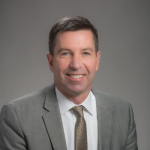 John Scott, MD, MSc, FIDSA, is a Professor of Medicine (Division of Allergy and Infectious Diseases) and Chief Digital Health Officer at UW Medicine. He graduated from Stanford University with a degree in Human Biology, attended Georgetown University School of Medicine cum laude, completed a residency in Internal Medicine at Stanford University Hospitals, and then obtained sub-specialty training in Infectious Diseases at the University of Washington. He joined the University of Washington faculty in 2005.
John Scott, MD, MSc, FIDSA, is a Professor of Medicine (Division of Allergy and Infectious Diseases) and Chief Digital Health Officer at UW Medicine. He graduated from Stanford University with a degree in Human Biology, attended Georgetown University School of Medicine cum laude, completed a residency in Internal Medicine at Stanford University Hospitals, and then obtained sub-specialty training in Infectious Diseases at the University of Washington. He joined the University of Washington faculty in 2005.
In 2009, he launched Project ECHO (Extension for Community Health Outcomes) in Washington State, the first place to replicate the ECHO model outside of New Mexico. This innovative telehealth program helps clinicians serving in rural and underserved areas with the evaluation and treatment of common, complex, chronic diseases. In 2015, he won the Warren Reid Award for excellence in health care for the state of Washington, in recognition of his telehealth work. He chairs the Washington State Telehealth Collaborative and serves on the Telehealth committee for the Infectious Disease Society of America. The Washington State Medical Association recognized him with the Grassroots Advocate Award in 2020 for his work in advocating for policy changes for telemedicine at the state and federal level.
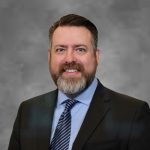 Joseph “Augie” D’Agostino, MEd, CISO, is currently the Chief Information Security Officer at University of Washington Medicine. The UW Medicine Security Program supports the hospital system, school of medicine (SOM), medical research, and Airlift Northwest. His career in information technology spans over twenty-five years. He has filled a variety of leadership roles in cyber security, governance, risk, and compliance over the last decade and has focused solely on healthcare for the last seven years. His most recent training was at Carnegie Mellon-Heinz College where he received a Chief Information Security Officer (CISO) Executive Certificate. Augie believes at the foundation of every successful security program exists a security aware culture that supports a “brilliant at the basics” approach to Information technology and security. He has a strong passion for mentoring, training, and developing others, providing opportunities to team members, and enabling others to see the “big picture” while working towards positive outcomes. He feels a powerful sense of purpose in the healthcare industry and enjoys working for an organization who has a mission “to improve the health of the public.”
Joseph “Augie” D’Agostino, MEd, CISO, is currently the Chief Information Security Officer at University of Washington Medicine. The UW Medicine Security Program supports the hospital system, school of medicine (SOM), medical research, and Airlift Northwest. His career in information technology spans over twenty-five years. He has filled a variety of leadership roles in cyber security, governance, risk, and compliance over the last decade and has focused solely on healthcare for the last seven years. His most recent training was at Carnegie Mellon-Heinz College where he received a Chief Information Security Officer (CISO) Executive Certificate. Augie believes at the foundation of every successful security program exists a security aware culture that supports a “brilliant at the basics” approach to Information technology and security. He has a strong passion for mentoring, training, and developing others, providing opportunities to team members, and enabling others to see the “big picture” while working towards positive outcomes. He feels a powerful sense of purpose in the healthcare industry and enjoys working for an organization who has a mission “to improve the health of the public.”
 Lenny Sanchez, JD, CHC, is the Director of Patient Privacy at UW Medicine Compliance. He has worked in the health care field for nearly fifteen years and is a proud Triple Dawg. Prior to attending the UW School of Law, Lenny served in roles at a private Institutional Review Board and the UW Institute of Translational Health Sciences. After graduation, Lenny investigated potential violations of the HIPAA Privacy, Security, and Breach Notification Rules as well as federal civil rights laws at the U.S. Department of Health and Human Services Office for Civil Rights. He then returned to the UW in 2014 as a Patient Information Privacy team member and has been directing the program since 2018. He is passionate about serving the academic medical center community and loves the dynamic, complex nature of the work.
Lenny Sanchez, JD, CHC, is the Director of Patient Privacy at UW Medicine Compliance. He has worked in the health care field for nearly fifteen years and is a proud Triple Dawg. Prior to attending the UW School of Law, Lenny served in roles at a private Institutional Review Board and the UW Institute of Translational Health Sciences. After graduation, Lenny investigated potential violations of the HIPAA Privacy, Security, and Breach Notification Rules as well as federal civil rights laws at the U.S. Department of Health and Human Services Office for Civil Rights. He then returned to the UW in 2014 as a Patient Information Privacy team member and has been directing the program since 2018. He is passionate about serving the academic medical center community and loves the dynamic, complex nature of the work.
 Terri Butler, PhD, works with faculty and students at the University of Washington and collaborating Pacific Northwest research institutions advising on commercialization pathways for biomedical technologies. She is the primary contact for the ITHS Drug and Device Advisory Committee and manages the WE-REACH Biomedical Entrepreneurship Training.
Terri Butler, PhD, works with faculty and students at the University of Washington and collaborating Pacific Northwest research institutions advising on commercialization pathways for biomedical technologies. She is the primary contact for the ITHS Drug and Device Advisory Committee and manages the WE-REACH Biomedical Entrepreneurship Training.
Terri draws on her industry experience to assist teams in vetting their ideas through a rigorous process of customer discovery, competitor analysis and market validation as well as laying out strategies for technical development. Prior to coming to the University Terri worked in key industry roles along the commercialization pathway, including invention, product development, FDA regulatory management, manufacturing scale-up, and sales and marketing. She has worked at large and small companies, including 3M, Molecular Genetics, Bioenergy Life Sciences, and multiple university spin-out companies. Products she has commercialized include monoclonal antibodies, pharmaceutical release liner, nutritional formulations, and non-medical technologies in the high-tech materials field. She is an inventor on 14 patents in coating processes, chemical formulations, and nutritional applications.
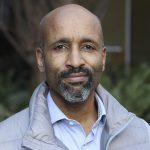 Teddy Johnson, PE, MBA is the Director of Technology Development at the Institute of Translational Health Sciences, a clinical associate professor in the UW School of Pharmacy, and a licensed professional engineer in the state of California. He joined the healthcare community over 25 years ago and has served start-up and Fortune 500 companies in research, design, clinical, marketing, and sales leadership roles; developing imaging, interventional, surgical, and digital health products. Over the years, Teddy has celebrated 2 IPO’s and 4 acquisitions, while earning numerous patents and commercializing dozens of new products worldwide. To foster the next generation of innovators, Teddy teaches in the Foster School Creative Destruction Lab (CDL) startup accelerator and the Biomedical Regulatory Affairs Master of Science (BRAMS) programs at the University of Washington, and he advises startup CEOs in Seattle, Vancouver, and Silicon Valley.
Teddy Johnson, PE, MBA is the Director of Technology Development at the Institute of Translational Health Sciences, a clinical associate professor in the UW School of Pharmacy, and a licensed professional engineer in the state of California. He joined the healthcare community over 25 years ago and has served start-up and Fortune 500 companies in research, design, clinical, marketing, and sales leadership roles; developing imaging, interventional, surgical, and digital health products. Over the years, Teddy has celebrated 2 IPO’s and 4 acquisitions, while earning numerous patents and commercializing dozens of new products worldwide. To foster the next generation of innovators, Teddy teaches in the Foster School Creative Destruction Lab (CDL) startup accelerator and the Biomedical Regulatory Affairs Master of Science (BRAMS) programs at the University of Washington, and he advises startup CEOs in Seattle, Vancouver, and Silicon Valley.
Please sign in below to access this form.
Access to this form is restricted to ITHS Members. Please sign in, or create an account.




